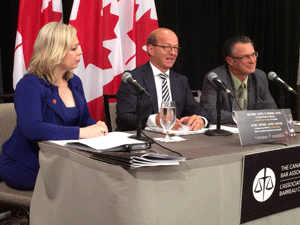A Senate committee has demanded the federal government immediately fill 44 judicial vacancies nationwide that it says are “hobbling” Canada’s justice system.
The Senate Committee on Legal and Constitutional Affairs released an interim report Aug. 12 outlining recommendations it says will help tackle court delays.
“We have a serious problem with court delays,” Senator George Baker, the deputy chairman of the committee, told reporters at the Canadian Bar Association conference in Ottawa.
“The innocent are left in limbo. The persons who committed crimes are left unprosecuted. Canadians are left frustrated. They are so frustrated that they have condemned our court process.”
In 2013-14, the median time between when a charge is laid in provincial courts and a case’s final disposition was 123 days, according to the report. In superior courts, the median completion time was 514 days.
Committee members said changes to tackle delays are all the more necessary after a recent Supreme Court of Canada decision, R v. Jordan, which put a cap on the amount of time a trial could be delayed. The court ruled that delays of 30 months or more in superior courts or 18 months in provincial courts will be considered unreasonable and charges could be stayed.
“We have now a crisis situation in this country (in) which you’re going to see tens of thousands of persons who are guilty of serious crimes in this country released, acquitted,” Baker said.
“In other words, they will no longer go to jail for what they’ve been convicted of simply because we have not made the proper changes in procedures relating to court operations.”
The committee echoed remarks made the day before by Supreme Court Chief Justice Beverley McLachlin who pleaded the government to fill the vacancies as soon as possible.
McLachlin called the situation a “perpetual crisis.”
In addition to demanding the vacancies be filled, the committee called on the federal government to work with its provincial and territorial counterparts to improve case management to decrease unnecessary court appearances.
The recommendations also asked the federal government to invest in court technology and work toward implementing restorative justice programs, alternative courts and shadow courts.










